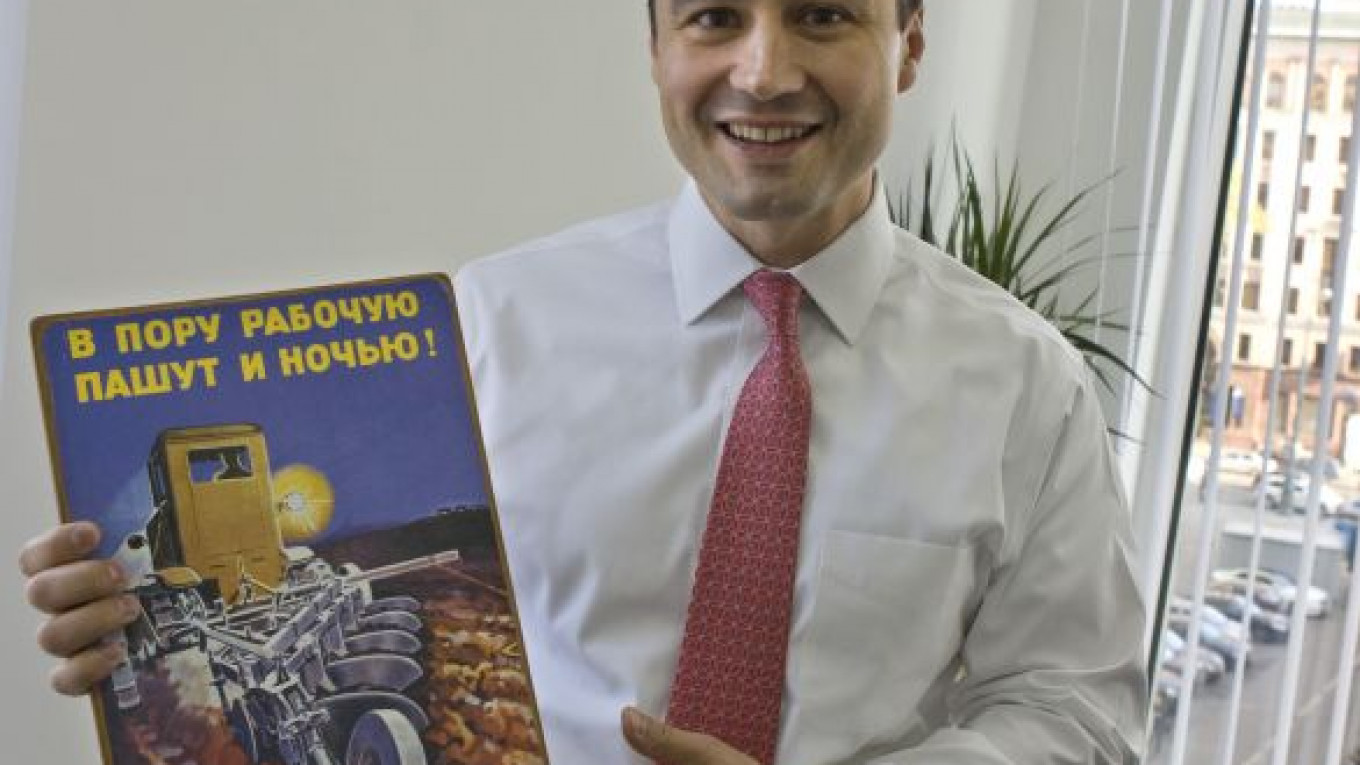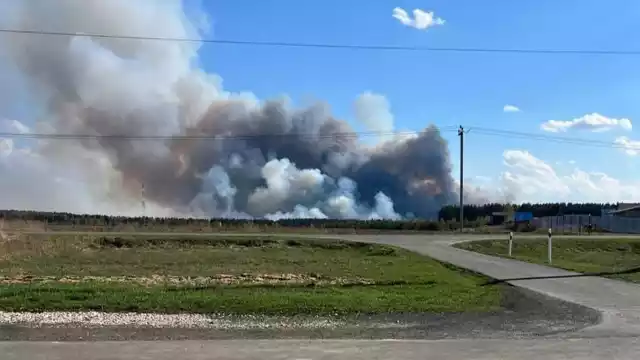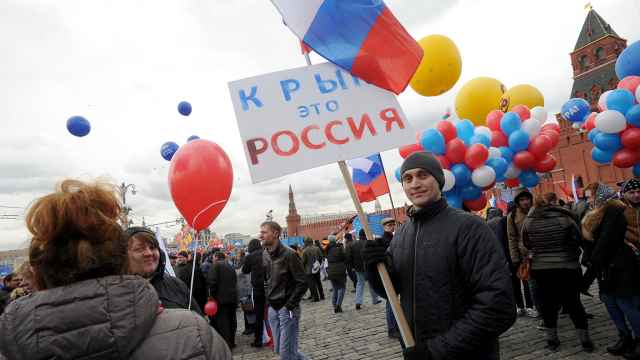Don't tell Patrick Ghidirim that the more than 250,000 hectares of rich black earth that he manages in central Russia is a free-market version of a mega collective farm.
"No, no, absolutely not," Ghidirim said in an interview. But, he added after a slight pause, "You have touched on something very interesting."
Call it Collective Farm 2.0.
Education
1995 – Connecticut College, BA in Economics
1997 – Woodrow Wilson School of Public and International Affairs, Princeton University, MPA
2004 – Harvard Business School, MBA
Work Experience
1997-99 – JPMorgan
1999-2000 – Goldman Sachs
2000-02 – Behrman Capital
2004-07 – Bunge Limited
2007-Present – AgroTerra (managing director) and NCH Capital Inc. (managing director of Agribusiness and Private Equity Investments)
Favorite book: “Battle Royale” (1999) by Koushun Takami
Reading now: “The E-Myth Revisited” (1995) by Michael Gerber
Movie pick: “True Romance” (1993) directed by Tony Scott
Favorite Moscow restaurant: Starlite Diner, various locations
Weekend getaway destination: Valencia, Spain
Ghidirim — the Moldovan-born, Princeton- and Harvard-educated managing director of AgroTerra, a group of regional holding companies — is determined to succeed where Communist planners failed and make Russia a world leader in corporate farming, a business where investors get involved in food production on a large scale.
The Soviet collective farm, Ghidirim said, could be described as the first large-scale attempt by a world superpower to introduce corporate farming. Direct government management doomed the effort.
Corporate farming, however, will allow Russia to become self-reliant for its own food supplies and feed a burgeoning world population at the same time, Ghidirim said.
"It's not a case where everybody is doing this and Russia just has to catch up," he said. "To some extent, Russia is at the forefront of this development."
Ghidirim, a 38-year-old U.S. national who oversees more than 1,000 full-time employees, including about 50 in AgroTerra's Moscow offices, sat down with The Moscow Times to explain why he decided to set up an enterprise with net assets of $500 million, how he reaps success without paying bribes, and how advice that he received from legendary investor Warren Buffett guides his vision.
This interview has been edited for length and clarity.
Q: Why did you come to Russia, and why have you stayed?
A: I was born in Chisinau, Moldova, and immigrated to the United States when I was about 18. I moved because I wanted to develop my human potential to the fullest. This is something that is a constant goal for me in my life. Each day I want to become a little bit better in order to open up my full potential. The first step on that road was getting a world-class education in the U.S. The next step was taking advantage of the professional opportunities for development and growth in the U.S.
When the chance came to go to the U.S., I packed my bags and within a couple of days was in the States with no more than the determination to become successful. I didn't have any relatives, I didn't have anybody in particular waiting for me. But my dad always used to say that all you need is to be in an environment of opportunity, and then, with hard work, you will succeed. So I wasn't afraid.
About my decision to move here: I have always thought of Eastern Europe as a very important part of my life, even though I moved to North America. This is where my roots are, and Russia is such a big country and I always knew that it would have a very important part in global history. I was always interested in Russia. Back in the '90s when I was on Wall Street, I started thinking about Russia, discussing the idea of becoming involved in the Russian economy. I remember a friend saying, "Oh, forget about it. It has an economy smaller than Holland." I thought to myself, "Well, you know, things can't stay that way, so at some point it will change."
Q: How was AgroTerra created?
A: I moved to Russia in 2006 with [multinational farming corporation] Bunge, but in mid-2007, as we were busy pushing forward a major acquisition, the board of directors basically got cold feet and said, "We want to re-evaluate our growth strategy in Russia. We want to see execution first. We want to see positive results with what we have here before we actually push forward."
I was left in Russia with a totally new strategy, where Russia had become less important for the company. They offered options to move to another location, to Geneva, New York or Singapore. By that time, I felt that I spent enough time in the corporate world. The reason for going to business school was to add general management training and skills to my deal making and financial analysis expertise. My thinking when going to business school was that I wanted to end up in private equity in Russia or Eastern Europe. Both Russia and Eastern Europe are emerging markets where you don't have a broad pool of managers from which you can pick and choose and put them in place in the portfolio companies that you acquire.
I was employed at AgroTerra to put together a team to devise and execute a strategy for creating a large agribusiness company that would be involved in a number of different parts of the value chain in Russia — from growing crops to storage and processing. We wanted to create an efficient agribusiness company that would be a leader both in terms of profitability and its management standards — something that Russia needs more of.
If you look at the world of agribusiness, Russia is one of the markets that will have to supply the additional food necessary to feed the growing population. Russia has no choice. It has to be able to fully feed its own population and also export to supply the growing demands of the world population. To do that, you obviously have to have an efficient agribusiness sector.
There's no doubt in my mind that Russia must and can feed itself. Just drive around, and you will see the resources that Russia has. Some of the best soil on earth, which is black earth, rich in organic matter, is concentrated in just a few locations around the world. Russia and Ukraine represent one of the three largest locations of this soil.
Russia has a favorable climate; it has an educated work force; it has a fairly good infrastructure system in place. Again, it's all relative. Of course, things could be better. But things could also be much worse, with no roads, no railroads and no electricity at all. So Russia is in a very good position to feed itself and export. What is necessary, obviously, is additional capital. But for capital to flow in, there has to be the infrastructure of a legal system.
Q: What advice would you offer a foreigner who wants to invest or expand in Russia?
A: You obviously have to gather as much data within the time frame that you have. In emerging markets and fast-growing markets like Russia, where you don't have a lot of data like in the U.S., looking at the data soon stops making sense. I remember building models with five years of history and 10-year projections. Well, often it doesn't make any sense to look at five years of history in Russia because the world is changing so quickly.
That said, you still have to gather as much information as possible within the time frame. You have to do your analysis, your homework, but then I think you have to have a strong bias for action. If you are, let's say, 70 percent sure that this is the right thing do to, then you have to start going forward. You absolutely cannot get stuck in an analysis-paralysis situation. The way you move forward is to start with small pilots and then adjust as you go. One of the biggest mistakes I think people can make is trying to make the model perfect. They spend a lot of time and then by the time they think they've got it, the market opportunity has moved away, somebody has moved in, or circumstances have changed in another way.
Here's another thing about Russia. Locals and foreigners alike can be very short-term in Russia. To be successful, you have to have a long-term perspective in Russia. You have to have the stamina, both personal as well as financial, and the support of both your superiors at work and your family to go through the inevitable ups and downs. But you have to have this stamina.
Q: How do you deal with bribery?
A: This is not something that we do. It was interesting to hear once that several people decided not to work for us. The reason, I was told, was, "You are too white. You guys don't pay bribes. You're too clean. You play too much by the rules." I said to myself, "We've achieved something here." Very quickly, the word about our ethics spreads. The question about corruption itself disappears. People don't ask you for money because they understand that this is not how you do business. If somebody asks you for a bribe, you have to be able to tell them, "Well, this is not what we do. If you make our life difficult, we'll just not come to your region; we will go and invest our money somewhere else in Russia." This is what we tell people. So far, it's working.
Q: What is your secret to successfully managing people and business in Russia?
A: People are people everywhere, so I will say a couple of things that you probably would hear anywhere in the word, and this is my personal management philosophy. Step No. 1 is you have to align your team around a set of values. The values that are important to us are openness and ethics. Based on that, we also value teamwork, a passion for results and continuous improvement. Step No. 2 is you have to walk the talk. That starts from the top, and it includes everybody. I constantly emphasize the fact that we have to live by what we say. We hire people based on our values. We make daily decisions based on our values. If people are not aligned with our values, then we part ways.
As for what is different about managing people in Russia, you have to always expect the unexpected and be flexible. When I say unexpected, it doesn't necessarily include negative things. There are positive things happening all the time when, for example, somebody like a government official or an employee goes the extra mile for no other reason than just to help and do a good deed. You have to be constantly flexible enough to respond to that. That's No. 1.
No. 2 — this is my personal passion — is to always look for a way to put structure into chaos — and the structure has to be flexible. One of the most difficult things to achieve in this life is to be structured yet flexible. The problem with most structures is that they ossify as soon as they are set in place. In Russia, based on principle No. 1 — expect the unexpected and be flexible — you have to put a structure in place that is flexible. Yet it would be wrong to say, "We have to be ready for anything, so let's not have any structure. Let's just improvise all the time."
In terms of managing people, I think it's super important to learn the language and the culture as quickly as possible. This is as much for business purposes, to truly be able to interact with people, as for personal reasons, to make your stay in Russia enjoyable. You have to appreciate the richness of the culture. Again, the better you understand both the culture and the language — and language is a great conduit of culture — the more you open yourself up to all the positives — again to the literature, the theater, and what I call the soulfulness, if there is such a term outside music, of the spirit of the Russian people.
I also would suggest hiring and promoting as many locals as possible — as soon as possible. Build a company that relies on locals, not on outsiders. The response I typically hear is, "But there aren't any locals who can perform to our standards." I say, "Hire people based on your values and the competence that you expect that you will need." It is very much possible to find the people, in Moscow and in Russia in general, who will match your requirements in terms of your values. Then, give them the support to develop.
Q: Like training?
A: Training is one example. I think the culture in a new company is very important. One of the greatest things about Harvard, for example, is not necessarily the professors. Case studies are also great, with the CEOs who come and give you the inside story at the end of any case about what actually happened. But one of the greatest things about Harvard, and Princeton as well, are the peers, my colleagues. I learned a lot from these highly motivated, intelligent people. Try to do the same with your team. Create an environment where you hire for excellence, reward excellence, and set up a true environment of teamwork where people help each other grow and develop.
Q: Who or what inspires you?
A: I'd say there are two problems in the world. One is that most of the common sense is not that common. The other is that it's not enough to know what to do; you must have the discipline to actually do it. That's what differentiates the top 10 percent from the other 90 percent. It's actually finding the discipline to do what you know that you have to do. How do you find that discipline? A lot of it comes from your family. It comes from your role models. But it's also something that can be fostered by the right environment.
One of the most incredible quotes that I carry with me is from Warren Buffett. He looked at us at a session at Harvard and said, "Look, you guys will all be successful at some point — some more, and some less. Don't worry about that, don't worry about success. Just remember one thing. You will eventually take on a lot of the characteristics of the people around you at the place where you end up working. Whether you like it or not, it will happen. So be very mindful and purposeful choosing the companies where you work. This is one of the most important choices you can make. Choose a company and surround yourself with co-workers who you want to become like."
I'll tell you another thing. Any expatriate arriving in the middle of the winter from New York, Geneva or London can feel a little downbeat making the trip down Leningradskoye. You've just left your relatives.
You've left your familiar background life, and here you are chugging along slowly on Leningradskoye. I've gone through that multiple times. Then, I arrive at our weekly Monday morning executive committee meeting, and I look around at my colleagues, at my team, and I felt so glad and proud. That is the answer to why I keep coming back. Our executive committee, at this point, is 100 percent Russian. I'm the only expatriate. I look at these people and see how dedicated they are — hard-working, intelligent, disciplined — and I feel good. I feel excited about working for a company surrounded by people who want to be more like me, and I want to be more like them.
The older you get, the more each minute of your time becomes truly valuable. As somebody said, there is one single, truly irreplaceable resource in life that we don't appreciate. This is time, our own time. I want every moment of my time to matter.
A Message from The Moscow Times:
Dear readers,
We are facing unprecedented challenges. Russia's Prosecutor General's Office has designated The Moscow Times as an "undesirable" organization, criminalizing our work and putting our staff at risk of prosecution. This follows our earlier unjust labeling as a "foreign agent."
These actions are direct attempts to silence independent journalism in Russia. The authorities claim our work "discredits the decisions of the Russian leadership." We see things differently: we strive to provide accurate, unbiased reporting on Russia.
We, the journalists of The Moscow Times, refuse to be silenced. But to continue our work, we need your help.
Your support, no matter how small, makes a world of difference. If you can, please support us monthly starting from just $2. It's quick to set up, and every contribution makes a significant impact.
By supporting The Moscow Times, you're defending open, independent journalism in the face of repression. Thank you for standing with us.
Remind me later.






